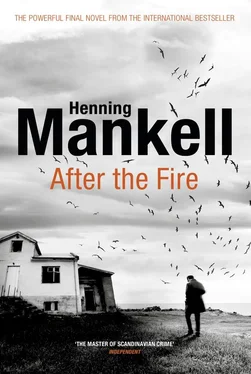I didn’t need to touch her to know that she was dead. She was lying on her back with one leg bent underneath her, as if she had tried to stop herself from falling. She was holding a spanner in one hand, and blood had trickled from her head onto the hard floor. Her eyes were closed. I went over, knelt down and checked her pulse; she was dead but not yet cold. Nor had her skin begun to take on the yellow, waxy pallor that comes after death. She had been dead for an hour at the most. There was nothing to indicate an assault; she had suffered either a stroke or a heart attack. Or perhaps a haemorrhage had sent her to her death with no warning.
I sat down on a grubby stool next to the wall where the tools hung in their designated places. I mourned her. Perhaps not as a friend, but as a person who had brought a certain security with her presence in my life.
First Nordin, now Oslovski. I was increasingly surrounded by dead people. The child growing in my daughter’s belly only partly redressed the balance between the living and the dead.
Afterwards I couldn’t explain why I did what I did, but I got up from the stool, took the bunch of keys out of Oslovski’s pocket and went over to the house. From the harbour I could hear the morning bus into town struggling up the steep hill. I waited until the sound of the engine had died away, then I unlocked the door.
I had never been in there before. The closest I had come was on the odd occasion when Oslovski had appeared and we had chatted on her tiny veranda. I had always felt that she wasn’t just standing there to talk to me; she was acting as a kind of sentry, making sure no unauthorised person crossed the threshold.
I stood there in the dark hallway; I was aware of the bitter smell that always seems to accompany loneliness. Had my own house smelled like that before it burned down?
I switched on the lights and walked slowly through the three rooms. On the steep staircase leading up to the attic were piles of newspapers and countless carrier bags from various grocery shops. I realised that Oslovski, in her isolation, had become a manic hoarder. The whole place was in chaos. Clothes, bundles of fabric, shoes, galoshes, hats, skis, a damaged kick sled, furniture, broken lamps, fishing nets. It was indescribable. Only the room containing her bed was remotely tidy. I paused in the doorway, struck by something I couldn’t quite put my finger on. Then I realised that in spite of the mess everything in the house was spotless. The piles of newspapers were dust-free, the sheets on the bed were clean. The cluttered kitchen contained a washing machine and a tumble dryer. In a bin bag on the floor next to the sink I could see the packaging from a French fish gratin, which might well have been Oslovski’s last meal. A single red chair with a plastic seat pad stood next to the small dark green Formica table.
It was clear that Oslovski had never expected or wanted dinner guests.
I went through the house one more time. Chaos and pedantic neatness, side by side.
I stopped. I had the feeling I had seen something to which I should have reacted. At first I couldn’t work out what it was, then I realised it was to do with her bedroom.
I went back up the stairs; as soon as I walked in I knew what it was.
The sheets had a sky-blue border adorned with stars. I had seen those same sheets very recently — in the deserted house in Hörum. There was no doubt. The bed in that house was made up with exactly the same sheets as those on Oslovski’s bed.
Oslovski must have been a lone vixen, I thought. She wasn’t running towards Golgotha, but perhaps she had a den with two exits. One where I was now, the other in the dilapidated house in Hörum. Perhaps she hid there when her fear of whatever it might be became too much for her?
Oslovski had lived close to us for many years, yet she had remained a stranger. Had she ever wanted to develop a closer relationship with us? Perhaps her fear, wherever it came from, was so great that she preferred to live alone in her den, with more than one exit and entrance?
She really had taken almost everything with her, I thought. She had left only a made-up bed in a house that was falling down, and a partially restored DeSoto in a garage. And a mystery no one will ever be able to solve: the mystery of loneliness.
I was sure it was Oslovski who had used that bed in Hörum, although I would never know why.
She had disappeared without a sound, leaving a cold, inaccessible trail.
The stale, musty smell was making me feel sick. I went out onto the veranda and called Jansson.
‘It’s me.’
I knew he always recognised my voice.
‘Where are you?’
‘I’m fine, thank you for asking. I’m down by the harbour. Oslovski is dead.’
There was a pause before Jansson responded; he sounded completely taken aback. ‘Oslovski is dead too?’
‘What do you mean, too?’
‘I was thinking about Nordin.’
‘Yes, Oslovski is dead. I found her in the garage. Either a massive stroke or a haemorrhage, I suspect.’
When Jansson spoke again, after another pause, he was on the verge of tears.
‘She was so lonely.’
‘We all are. We die alone. At least when we’re born we have company.’
Jansson’s lachrymose mood suddenly switched to anger. ‘What the hell is that supposed to mean?’
‘It means exactly what I said: at least we have our mother with us when we’re born. Even if she’s half-crazy with pain.’
Silence once more. This time I didn’t bother waiting.
‘I want you to pick me up,’ I said. ‘In two hours. I need to sort out this business with Oslovski first.’
‘What were you doing in her garage?’
‘I usually stop by to say hello. She never let anyone into the house, but I used to pop into the garage when she was working on her old car.’
‘A Cadillac, wasn’t it?’
‘A DeSoto.’
‘And she died, just like that?’
‘We can talk about it when you pick me up. In two hours. I need to call the police now.’
Jansson reluctantly let me go. I went back into the garage and replaced the keys in Oslovski’s pocket. To be on the safe side, I checked her pulse one more time.
Oslovski was and remained dead.
I called the emergency number, gave my name and location, explained that I was a doctor and that I had found a dead woman in a garage. When I was asked if a crime could have been committed, I said no.
The unnatural life Oslovski had lived had ended with her death from natural causes.
I went out onto the road and waited. When it got too cold I went and sat in the car. In my mind my fingertips were caressing Lisa Modin’s shoulders.
It was forty-five minutes before a police car and an ambulance arrived. When I saw them coming down the hill towards the harbour, I went out into the road to meet them. I didn’t recognise the two police officers. One of them reminded me of my daughter: the same determined look, which could be interpreted as stand-offishness by those who didn’t know her.
We went up to the garage with the paramedics, two older, stronger men. I told them about Oslovski and the fact that I had her permission to park my car on her property. We stopped outside the door.
‘She’s in there,’ I said. ‘I’m a doctor, and I’m sure she’s dead.’
I waited outside. I was finding the thought that Oslovski was gone more and more depressing. I had never really known her, but we had lived at the same time. She was one of the people with whom I had shared my life, and now she was gone. A part of my world had disappeared.
The paramedics came out.
‘We’re not allowed to transport dead bodies in the ambulance,’ one of them said.
‘We’ve sent for the body wagon,’ the other one said. ‘Looks like a stroke to me.’
Читать дальше












